Over U.S. objections, Hopi tribal masks sold in France

PARIS -- Dozens of Native American masks were sold at auction Friday despite objections by the Hopi tribe, which considers the items sacred, and the U.S. government.
The 70 masks sold for a total of about $1.2 million after a French court approved the auction, rejecting arguments by the Hopi tribe and its supporters that the items should not be up for sale because they are “sacred figures” of their ancestors, not art.
A mask called “Mother Crow” sold for about $209,000. Another one, “Mud Head,” was bought for $4,840 by an organization that plans to return it to the Hopis.
The tribe’s lawyer, Pierre Servan-Schreiber, said the court’s decision to allow the sale and dispersement of the masks was disappointing.
“The probability of them being returned to their rightful owners, the Hopi, is very slight,” Servan-Schreiber said outside the Paris courtroom. “The Hopi tribe will be extremely saddened by the decision.”
Gilles Neret-Minet, of the Neret-Minet Tessier & Sarrou auction house behind the sale, said he was “happy that French law has been respected.”
“I am also very concerned about the Hopi tribe’s sadness, but you cannot break property law,” Neret-Minet told reporters. “These are in [private] collections in Europe and are no longer sacred. When objects are in private collections, even in the United States, they are no longer sacred.”
The items, mainly Hopi tribal artifacts dating to the 19th and early 20th centuries, went on display at the Drouot auction house before the sale. The masks, made from wood, leather, horse hair and feathers and painted in vivid red, blue, yellow and orange, are thought to have been removed from a northern Arizona reservation in the 1930s and ‘40s.
The Hopi tribe, which now numbers fewer than 14,000 people, keeps its masks, called Kachina and believed to be actual spirits, out of public view and considers it sacrilegious even for pictures of the objects to be shown. The masks are referred to as “qwatsi” – friends – and are worn during ceremonial dances to represent deities, but also mythical ancestors.
On Thursday, U.S. ambassador to France Charles H. Rivkin sent a letter to the French government and the auction house asking for the sale to be delayed. Rivkin on Friday tweeted in French: “Sad to learn that cultural objects sacred to the Hopi have been sold at auction today in Paris.”
Actor Robert Redford, who was among those who supported the Hopi tribe’s opposition to the sale, had issued a statement through a London-based organization called Survival International, which fights for the defense and protection of indigenous people.
“To proceed with this sale would be, in my opinion, a sacrilege, a criminal act that raises serious moral repercussions,” Redford said. “I hope these sacred objects will be returned to their legitimate owners, the Hopis.”
ALSO:
French Senate approves gay marriage bill
Kerry stresses ‘possibilities of peace’ for Koreas
Egypt president uses tweets to convey kinder, gentler side
More to Read
Sign up for Essential California
The most important California stories and recommendations in your inbox every morning.
You may occasionally receive promotional content from the Los Angeles Times.









